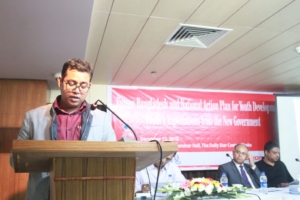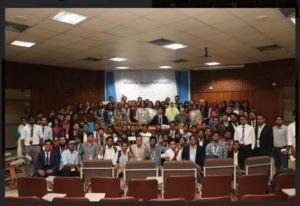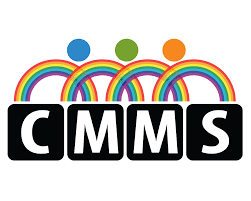Working towards Formulating a Youth Action Plan to Implement National Youth Policy 2017
 The role of Youth has always been a top priority in the discussions of development and moreover Bangladesh is going through the phase of demographic dividend where youth consists of one-third of its population. In the eve of the 11thNational Parliamentary Election of Bangladesh, young people seem to have the major concerns to be addressed by the upcoming government. A consistent study is needed to estimate the concerns of the youth, to carry the words from the youth to the stakeholders. Considering these, Center for Men and Masculinities Studies (CMMS) with support from ActionAid Bangladesh conducted a survey among 1000 young people aging from 15 to 35 from 8 divisions of Bangladesh to identify youth’s expectations from the upcoming new government and the areas of priority for them regarding implementation of the National Youth Policy 2017. In this study equal number of male and female was ensured, equal participation from rural and urban areas was also measured.
The role of Youth has always been a top priority in the discussions of development and moreover Bangladesh is going through the phase of demographic dividend where youth consists of one-third of its population. In the eve of the 11thNational Parliamentary Election of Bangladesh, young people seem to have the major concerns to be addressed by the upcoming government. A consistent study is needed to estimate the concerns of the youth, to carry the words from the youth to the stakeholders. Considering these, Center for Men and Masculinities Studies (CMMS) with support from ActionAid Bangladesh conducted a survey among 1000 young people aging from 15 to 35 from 8 divisions of Bangladesh to identify youth’s expectations from the upcoming new government and the areas of priority for them regarding implementation of the National Youth Policy 2017. In this study equal number of male and female was ensured, equal participation from rural and urban areas was also measured.
With the findings of the survey CMMS and ActionAid Bangladesh hosted a policy dialogue titled “Future Bangladesh and National Action Plan for Youth Development: Youth’s Expectations from the New Government” to identify priorities for Youth Development Action Plan in Bangladesh. The event was organized at the Tawfiq Aziz Khan Seminar Hall, The Daily Star Center on 12th December,2018 at 11am.
Professor Dr. Rahmatullah, Dean, Faculty of Law, Dhaka University, Mr. AnowarulHaq, Social Development Adviser, DFID, Mr. A K M Mamunur Rashid, Climate Change Specialist, UNDP BangladeshandMr. AnikAsad, Country Director, HEKS EPER werepresent as the panel discussants.Dr. SazzadHossain, Associate Professor, International Relations, Dhaka University presented the research findings while Dr. SayedSaikhImtiaz, Chairperson, Center for Men and Masculinities Studies and Associate Professor, Department of Women and Gender Studies, University of Dhaka moderated the session.
Around fifty policy makers, youth representatives from different regions, representatives from the students’ organizations, law enforcement bodies, social workers, NGO workers, and journalists participated in the dialogue.
Shadow Youth Parliament

Young people apprehend the newest knowledge, generate new ideas and endow the courage to explore beyond the age-old traditional norms and practices. Youths are thus full of potentials and possibilities to initiate change in any society. With one-third of its population being young (18-35 years) [BBS, 2015], Bangladesh enjoys a great potential of demographic dividend. However, reaping the benefits of demographic dividend depends on how the youth are integrated into the development process. Engaging the young people in the development journey is also crucial. The participation of youth needs to be reflected at all levels of development which requires youth-friendly infrastructure, policies and patronization of youth organizations. To initiate platform to bring youth together to discuss their priorities and challenges, Center for Men and Masculinities Studies (CMMS) and UNYSAB jointly organized Youth Parliament with the support of Action Aid Bangladesh on November 7 2019. It followed the session procedure of National Parliament of Bangladesh. In this parliamentary session youth shared their views and opinions regarding youth issues and sectors which need more concentration.
Dr. Sayed Saikh Imtiaz, Chairperson, CMMS played the role of the speaker. Nahim Razzaq, MP, Wasequa Ayesha Khan, MP, Rumana Ali, MP, Faraha Kabir, Country Director, ActionAid Bangladesh, Shammy Wadud, President, UNYSAB were present in the shadow parliament as guests.
The parliamentarians discussed on the issues to be emphasized in the 8th Five Year Plan (2021-2025). This session bought out youth inclusion, youth thoughts, and youth issues. Employment for the youth, specially focusing on startup investment and planning for sustainable environment were the important proposals emerging from the parliament.
Working towards Reflecting Youth Aspirations in the upcoming 8th Five Year Plan
From its independence, Bangladesh is proceeding with the Development Philosophy that Growth with equity and social justice would remain the overarching goal of development strategy and in order to pursue inclusive growth strategy, main aim would to reduce poverty and inequality by ensuring access of the poor to economic resources and employment, reducing regional imbalance in development and by raising economic participation of Women and Youth as well as disadvantaged groups (GED, 2015). After independence, Planning Commission of Bangladesh was established in January 1972 and First Five Year Plan was adopted in 1973 (1973-78). Accordingly, between FY1973 and FY2002 Bangladesh implemented 5 successive Five Year Plans and an interim Two Year Plan (1979–80). From FY2003 to FY2010, there was a deviation from the five year plan (period of plan holiday) to a process of shorter term Poverty Reduction Strategy Paper (PRSP).The present democratic Government decided to switch back to the five year plan mechanism from 2011-15. The seventh Five Year Plan has been being implemented during the period of 2016-20. Currently, Bangladesh is going through the window of opportunity of demographic dividend with a huge young and productive workforce that will continue to increase until 2030. Bangladesh needs to get robust programs in place to best utilize the demographic dividend. As participation of youth is embedded in the development philosophy of Bangladesh, it sounds more relevant in the current stage of demographic dividend to include the priorities of the youth in the Five Years Plans. On the eve of planning for 8th five Year Plan, a systematic study is needed to know about the priorities of the youth and to bring forward the findings to relevant stakeholders so that the concerns as well as ideas of youth can be reflected in the 8th Five Year Plan. Center for Men and Masculinities Studies have conducted a research to find out the focus of the youth and their expectations of the national youth policy and the 8thfive year plans. ActionAid Bangladesh has supported the research. A round table discussion on Youth Aspirations in the upcoming 8th Five Year Plan was organized on 26th December, 2019.
Throughout the study, the youth came up with concrete suggestions that can be reflected in the upcoming 8th Five Year Plan. The specific recommendations that can be derived from their suggestions are as such
- Ensuring Quality Education:
- Developing ICT based education system
- Establishing Govt. Vocational Institutions in every district
- Introducing Uniform education system and play based evaluation till primary level
- Ensuring admission quota for physically challenged people
- Ensuring Life skill and knowledge regarding SRHR in educational curriculum
- Creating a link between education and job opportunities
- Ensuring Job Opportunities
- Initiative for employment within the country was the most important factor according to the youth
- Ensuring self employment, mostly through agriculture
- Ensuring self employment through in informal and online business
- Promoting Free lancing and outsourcing
- Making youth capable for 4th industrial revolution
- Training opportunities are needed for ensuring employability
- Taking proper measure for urbanization
- Ensuring Civic facilities
- Inclusive Housing Facilities
- Commercial set up need to isolated from the residential area
- Safety Compliance needs to be ensured
- Ensuring Political Participation Of Youth
- Integrating youth in civic and political process
- Raising Awareness about good governance
- Involving youth in social services
- Ensuring Gender Justice
- Including SRHR in education system
- Flexibilities in the job hour specially for women/mothers
- Ensuring rights of third gender people.
- Allocating special bus facilities for the convenience of women in their ways to job and education.
- More programs for engaging Men and Boys.


